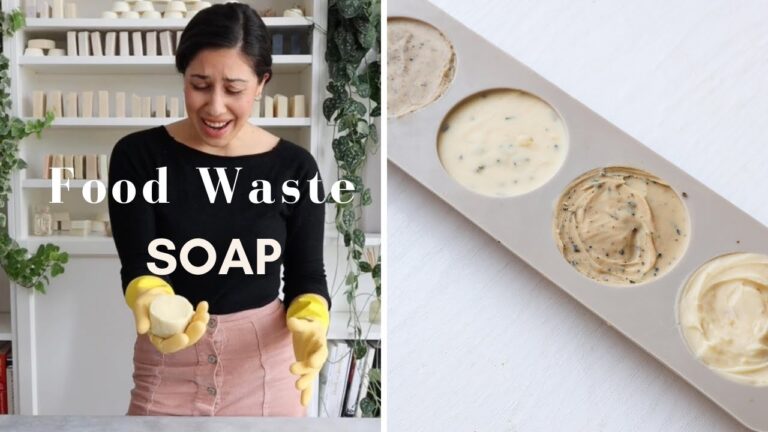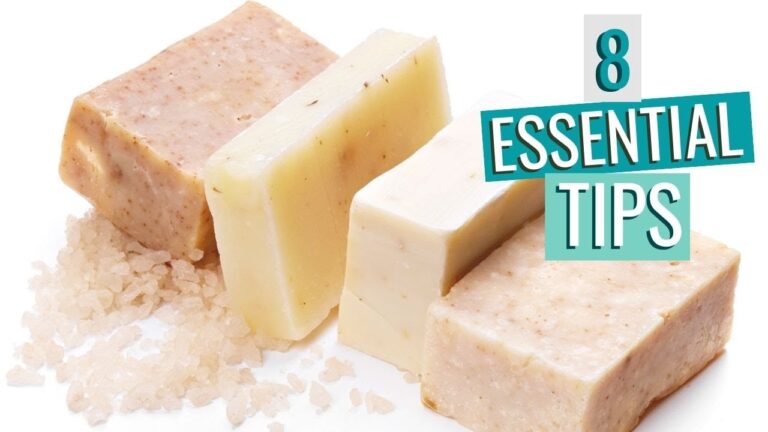Are you looking for a simple and effective way to reduce waste in your everyday routine? Homemade soap may be the answer you’ve been searching for. By creating your own soap at home, you can eliminate the need for plastic packaging and harmful chemicals found in store-bought options. Join the movement towards a more sustainable lifestyle and discover the benefits of making your own soap today.
Is homemade soap eco-friendly?
Homemade soap is considered eco-friendly due to its use of natural ingredients and minimal packaging compared to commercial soap production. By avoiding harmful chemicals and reducing waste, homemade soap making significantly lessens its environmental footprint. This sustainable approach to soap making contributes to a cleaner and healthier planet.
In contrast to commercial soap manufacturing, homemade soap production focuses on utilizing natural ingredients and eco-friendly practices. This results in a low-waste and zero-toxin production process that benefits both the environment and consumers. Making the switch to homemade soap can have a positive impact on reducing pollution and supporting a more sustainable lifestyle.
Choosing homemade soap over commercial options is a simple yet effective way to promote eco-friendliness in everyday routines. By prioritizing natural ingredients and sustainable practices, homemade soap makers contribute to a cleaner environment and healthier communities. Making conscious choices in personal care products can make a significant difference in reducing our ecological impact.
What are the negative effects of soap on the environment?
Soap can be bad for the environment because it often contains chemicals and ingredients that can be harmful to aquatic life and waterways. These include phosphates, surfactants, and fragrances, which can contribute to water pollution and harm fish and other organisms.
Additionally, the production and disposal of soap can also have negative effects on the environment. The manufacturing process can release pollutants into the air and water, while the packaging and waste from soap products can contribute to landfill and plastic pollution.
To minimize the environmental impact of soap, it is important to choose biodegradable and environmentally friendly options, and to use them sparingly. Look for soaps that are free from harmful chemicals and come in minimal or recyclable packaging, and try to limit excess use and waste. By making conscious choices about the soap products we use, we can help protect the environment and its delicate ecosystems.
What are the disadvantages of homemade soap?
Homemade soap, while often touted for its natural ingredients and customizable scents, does come with some disadvantages. One of the main drawbacks is the lack of consistency in quality and texture. Since homemade soap is typically made in small batches by hand, there can be variations in color, scent, and effectiveness from one batch to the next. This can be frustrating for those who prefer a uniform product.
Another disadvantage of homemade soap is the potential for uneven distribution of ingredients. Without the use of professional equipment and precise measurements, homemade soap makers may struggle to evenly distribute ingredients throughout the soap. This can result in bars that are unevenly scented or that do not provide the desired benefits for the skin. Overall, while homemade soap can be a fun and creative hobby, it may not always deliver the same level of consistency and quality as commercially produced options.
Eco-Friendly Suds: The Benefits of DIY Soap Making
Are you looking for a fun and eco-friendly hobby? DIY soap making is the perfect solution! Not only is it a creative and rewarding activity, but it also allows you to reduce your environmental impact by using natural and sustainable ingredients. By making your own soap, you can avoid harmful chemicals and plastic packaging, while also customizing scents and textures to suit your preferences. With just a few simple ingredients and a little bit of creativity, you can create luxurious, eco-friendly suds that are good for both you and the planet.
The benefits of DIY soap making are endless. Not only does it give you the opportunity to reduce waste and avoid harmful chemicals, but it also allows you to support local and sustainable businesses by sourcing natural ingredients. Additionally, DIY soap making can be a therapeutic and relaxing activity, providing a sense of accomplishment as you create beautiful and functional products. Whether you’re a seasoned crafter or a beginner looking for a new hobby, DIY soap making offers a sustainable and satisfying way to indulge in self-care and contribute to a greener, cleaner planet.
Sustainable Squeaky Clean: How Homemade Soap Helps the Planet
Looking for a sustainable way to keep your hands and body squeaky clean? Homemade soap is the answer! By using natural ingredients and reducing plastic waste, homemade soap is not only better for your skin, but also better for the planet. With simple recipes and easy techniques, you can create your own eco-friendly soap at home, cutting down on the harmful chemicals and packaging found in store-bought options.
When you choose homemade soap, you’re making a positive impact on the environment. By using natural ingredients and reusable packaging, you’re reducing your carbon footprint and helping to minimize plastic pollution. With a little creativity and effort, you can play a part in keeping the planet squeaky clean for future generations.
Incorporating homemade soap into your daily routine is a simple and effective way to reduce waste and promote sustainability. By utilizing natural ingredients and reusable packaging, you can contribute to a healthier environment while also enjoying the benefits of a luxurious, personalized skincare experience. Making the switch to homemade soap not only minimizes your carbon footprint, but also empowers you to take control of the products you use on your body. So, why not give it a try and join the movement towards a cleaner, greener future?



